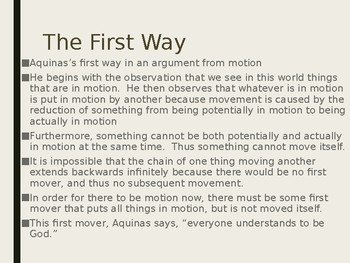· Apologetics > Apologetics in Christianity > God · 5 min read
Transformative Ways Thomas Aquinas Shaped Christian Thought: Biblical Insights
Explore five key ways in which Thomas Aquinas, the influential theologian and philosopher, shaped Western thought and theology. Delve into his contributions to metaphysics, ethics, and natural law theory in this enlightening article.

Five Ways Thomas Aquinas
The Five Ways of Thomas Aquinas are rational arguments used to defend the existence of the Christian God. Aquinas intended these arguments to provide a rational case for God’s existence based on common observations. It is important to note that the Five Ways are not meant to be a complete and airtight case for God’s existence but rather an introduction to the idea.
1. The Un-Moved Mover
Aquinas’s first argument is based on the observation of change in the universe. He argues that everything that changes from a potential state to an actual state requires something else to actualize it. This chain of changes cannot be infinitely long, so there must exist an un-changed and un-changing thing that is the ultimate cause of all other changes. This un-changed thing is what Aquinas refers to as the Un-Moved Mover, which is God.
Why This Matters
Understanding the concept of the Un-Moved Mover helps us grasp the idea that there must be a source or cause behind all the changes we observe in the universe. It points to the existence of a transcendent and eternal being who is responsible for initiating and sustaining all change.
Think About It
Consider how every action you take or observe requires some kind of cause or initiator. Reflect on how this observation aligns with the idea of God as the Un-Moved Mover.
2. The First Cause
Aquinas’s second argument focuses on cause and effect in the universe. He observes that everything that occurs is caused by something else. This chain of causation cannot be infinite, or else nothing would have come into existence in the first place. Therefore, there must be an un-caused cause, which Aquinas identifies as God, the First Cause.
Why This Matters
Recognizing the existence of a First Cause helps us understand that everything in the universe has a cause and that there must be an ultimate cause behind it all. It points to the idea that God is the ultimate source and initiator of all causation.
Think About It
Consider the causes and effects you observe in your daily life. Reflect on how this observation aligns with the concept of God as the First Cause.
3. The Necessary Being
Aquinas’s third argument centers around the observation that nothing in the universe is necessary. Everything we observe is contingent and subject to change or ceasing to exist. However, if everything were impermanent and there has been an infinite amount of time, then nothing would exist at all. The fact that anything exists at all implies the existence of a non-contingent being, which Aquinas refers to as God, the Necessary Being.
Why This Matters
Understanding the concept of a Necessary Being helps us grasp the idea that there must be something or someone who necessarily exists and upon which all other contingent things depend. It points to the existence of a being whose existence is not dependent on anything else.
Think About It
Reflect on the nature of impermanence and contingency in your own life and in the world around you. Consider how this observation aligns with the concept of God as the Necessary Being.
4. The Ultimate Standard
Aquinas’s fourth argument focuses on the existence of standards or properties by which we compare things. He observes that we instinctively see degrees of qualities such as goodness, power, or morality, implying that there must be an ultimate standard against which to judge these properties. Aquinas identifies this ultimate standard as God, the Ultimate Standard.
Why This Matters
Recognizing the existence of an Ultimate Standard helps us understand that there is a source from which all comparative properties derive their meaning and measurement. It points to the idea that God is the ultimate source of goodness, power, and other qualities.
Think About It
Consider how you determine what is good, powerful, or moral. Reflect on the idea that there must be an ultimate standard against which these qualities are measured, and how this aligns with the concept of God as the Ultimate Standard.
5. The Grand Designer
Aquinas’s fifth argument centers around the observation that many things in the universe exhibit a purposeful drive or intentionality. However, these things themselves do not possess intelligence. This leads to the conclusion that their purposeful behavior must be the result of an external intelligence. Aquinas identifies this intelligent entity as God, the Grand Designer.
Why This Matters
Understanding the concept of a Grand Designer helps us recognize that there is evidence of purpose and design in the universe. It points to the idea that there must be an intelligent being who has designed and orchestrated the functions and purposes we observe.
Think About It
Reflect on the purposeful behavior you observe in nature or in human-made objects. Consider how this observation aligns with the concept of God as the Grand Designer.
In summary, the Five Ways of Thomas Aquinas provide rational arguments for the existence of God based on observations of change, cause and effect, contingency, standards of comparison, and purposeful behavior. These arguments help us understand that there must be a transcendent and eternal being who is responsible for initiating and sustaining all changes, causes, necessities, standards, and designs in the universe. They invite us to reflect on the nature of existence and consider the implications of a divine creator.



